Schumer, speaking at Baxter in Medina, says solutions coming for microchip crisis in manufacturing
Global supply chain crisis disrupting many industries
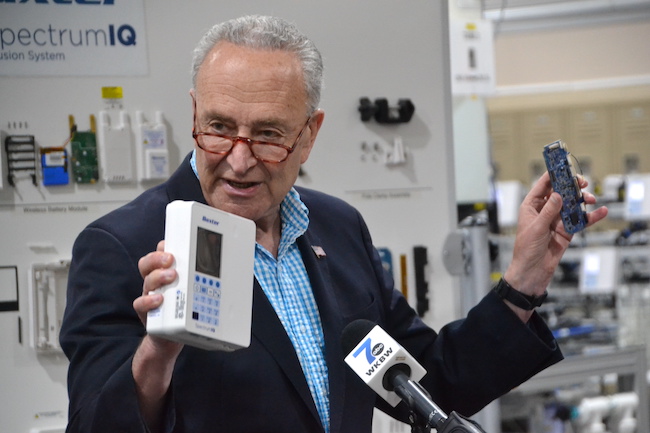
Photos by Tom Rivers: U.S. Majority Leader Chuck Schumer holds a medical infusion pump produced by Baxter International in Medina at left and a component of the pump requiring 70 microchips.
MEDINA – A company with nearly 300 workers in Medina has put employees on paid furloughs three times due to a supply chain shortage, where Baxter International didn’t have all 20 components for their medical infusion pumps.
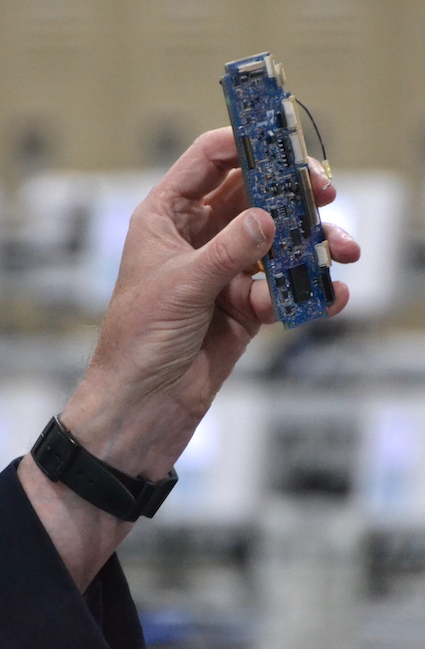
Baxter International produces about 100,000 pumps a year and each one needs 70 microchips. The company was forced to put some of its Medina workforce on paid furloughs due to a shortage of microchips.
Baxter continues to struggle to locate enough microchips. The company currently will run out in three to four weeks in Medina. If more don’t come in, company CEO José (Joe) E. Almeida said workers will again have to go on furlough until all the needed parts come in.
“I’m very proud of our employees,” Almeida said today after a news conference at Baxter with U.S. Senate Majority Leader Chuck Schumer. “They’ve worked heroically.”
Almeida said the company manufactures infusion pumps used at hospitals and healthcare sites.
“It’s about saving lives,” he said.
Schumer said there will be a long-term answer to the microchip crisis with the signing this week of the bipartisan CHIPS & Science Bill. That will provide $50 billion in incentives to increase microchip manufacturing in the United States and ease the supply chain problems.
He said the nearby STAMP site in the Town of Alabama, Genesee County, is being pitched to businesses to manufacture microchips and other advanced manufacturing. He said the site could employ thousands of workers, with many living in Orleans County.
He also is working his contacts for a short-term solution for Baxter. He will be asking Texas Instruments to supply microchips to Baxter, and has teamed with the federal Health and Human Services Department to prioritize the need for Baxter, which he said is a healthcare manufacturer that saves lives with the infusion pumps.
Schumer said he has personally advocated to companies before, including Qualcomm, to help with a microchip shortage.
“There is a desperate shortage of chips,” Schumer said. “We don’t want to have a shortage again. We want to build the chips here in America.”
Schumer praised the Baxter facility for producing the medical technology, such as infusion pumps, that are used in the treatment of Covid-19 and other illnesses.
“Orleans County’s Baxter International facility worked nonstop through the pandemic to get medical equipment out to the hospitals and frontline works that needed it most,” Schumer said. “My just passed CHIPS and Science Bill is just what the doctor ordered to help cure America’s long-term supply chain woes, by bringing microchip manufacturing back from overseas to places in Upstate New York like the Western New York STAMP campus. We should be making semiconductors in Batavia, NY, not Beijing.”
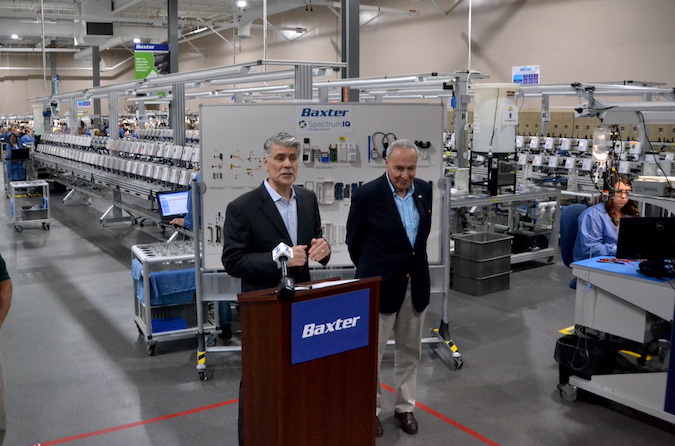
Baxter International CEO and President José (Joe) E. Almeida stands next to Sen. Schumer near the production floor of Baxter’s Medina plant in the Olde Pickle Factory. Almeida said the company has a three- to four-week supply of microchips and is reaching out to many suppliers. Schumer said he would strongly urge Texas Instruments to help fill the need at Baxter.
Schumer said that the microchip shortage is impacting everything from wait times for people to buy cars and computers, to healthcare providers.
Before coming to Baxter, Schumer was in LeRoy at the Bob Johnson Chevrolet, where the auto dealer said a shortage of microchips has slowed inventory. That problem has pushed up the cost and wait times for new vehicles. It also has made the cost of used cars skyrocket, Schumer said.
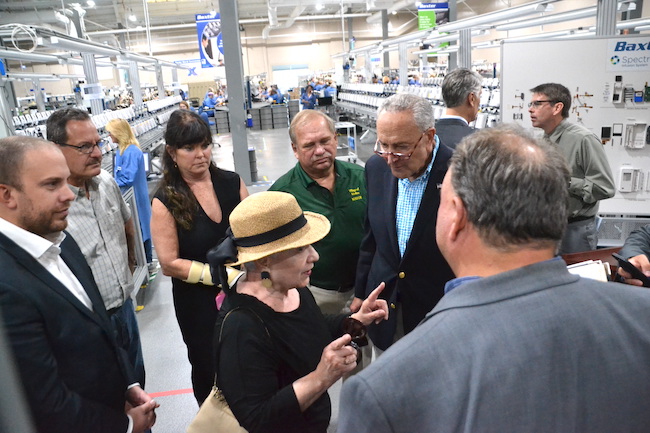
Gabrielle Barone, vice president of business development for the Orleans Economic Developer Agency, told Schumer that Medina has 300 acres of certified shovel-ready land that would be a good fit for a company looking to produce microchips. She is joined by, from left: Michael Dobell, Orleans EDA executive director; County Legislator John Fitzak; Lynne Johnson, chairwoman of the Orleans County Legislature; and Medina Mayor Mike Sidari.
Schumer highlighted the CHIPS & Science Bill
- $39 billion for the CHIPS for America Fund to provide federal incentives to build, expand, or modernize domestic facilities and equipment for semiconductor fabrication, assembly, testing, advanced packaging, or research and development to help attract major chip manufacturers to shovel ready sites like STAMP in Genesee County.
- $11 billion for Department of Commerce research and development including creating a National Semiconductor Technology Center (NSTC) a public-private partnership to conduct advanced semiconductor manufacturing, with Albany Nanotech primed to be a top contender to serve as a major hub for the NSTC, and other specialized R&D programs that universities across the state are in a strong position to compete for.
- $2 billion for the DoD CHIPS for America Defense Fund.
- $200 million for the CHIPS for America Workforce and Education Fund to kick start development of the domestic semiconductor workforce, which faces near-term labor shortages, by leveraging activities of the National Science Foundation.
- A new Investment Tax Credit for semiconductor manufacturing facilities and equipment.
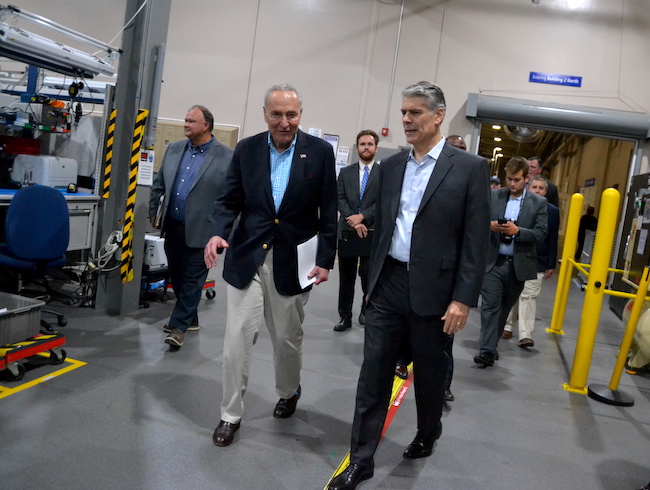
U.S. Sen. Chuck Schumer walks into the production floor at Baxter International with company CEO and President José (Joe) E. Almeida. Schumer said he and the federal Health and Human Services have pushed to make Baxter designated as a “critical need” for micro chips to manufacture infusion pumps.
Schumer’s Office shared this copy of the letter he sent to Rich Templeton, CEO of Texas Instruments:
Dear Mr. Templeton,
I write to request Texas Instruments’ (TI) assistance to continue to provide the required computer chip components to Baxter International to ensure it can continue to manufacture lifesaving medical devices that the U.S. Department of Health and Human Services (HHS) has determined are in “critical need” including Baxter’s Spectrum IQ Infusion Pump which is manufactured in Medina, New York, as well as the PrisMax and PrismaFlex renal replacement therapy (CRRT) devices. These pumps and devices are critical in the clinical treatment of COVID-19 patients, providing lifesaving care in our nation’s efforts to combat the pandemic.
As such, I understand TI recently received a copy of a letter from HHS’ Assistant Secretary for Preparedness and Response that indicated HHS has now “identified a critical need” for these lifesaving products and urged Baxter to prioritize the manufacturing of these medical devices. Furthermore HHS wrote, “it is critical that Baxter’s supply chain is not impacted so we also request that any work, services, and materials requested by Baxter be prioritized in any possible way.”
As you know, TI is Baxter’s supplier for several critical components required for the manufacturing of these devices. Recent inconsistent delivery of these TI components is now threatening the continued manufacturing of these critical medical devices. Ensuring the availability of these component parts is not only vital to Baxter’s Medina, NY workforce, but to hospital patients and medical personnel throughout the country who depend on these lifesaving devices.
Therefore, I ask that TI honor this HHS request and work with Baxter to deliver necessary TI components for their medical devices as quickly as possible. I appreciate your quick attention to this matter and your assistance in making these components available.





































































